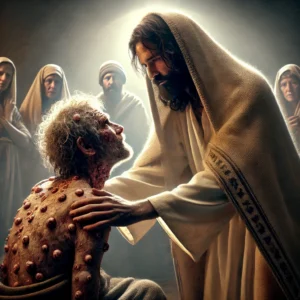
One of the most striking aspects of Jesus’ ministry was his radical inclusivity, especially in his embrace of the marginalized and outcasts of society. Lepers, sinners, tax collectors, women, and others who were often rejected or ignored found acceptance and dignity in Jesus’ presence. His willingness to challenge societal norms and extend love to the outcasts is a key feature of his teachings and a model for compassionate living. Let’s explore how Jesus’ actions and teachings uplifted the marginalized and challenged the status quo of his time.
Embracing Lepers: Overcoming Fear and Stigma

In the time of Jesus, leprosy was one of the most feared and stigmatized diseases. Lepers were considered unclean, both physically and spiritually, and were often isolated from their communities to avoid contamination. However, Jesus broke through these barriers with compassion and healing.
In Matthew 8:2-3, a leper approaches Jesus and says, “Lord, if you are willing, you can make me clean.” Instead of recoiling, Jesus reaches out, touches him, and says, “I am willing. Be clean!” This act of touching a leper was revolutionary—it not only healed the man physically but also restored his dignity, showing that no one is beyond the reach of God’s love. By interacting with lepers, Jesus rejected societal fear and stigma, emphasizing the importance of compassion over exclusion.
Dining with Sinners and Tax Collectors: Breaking Social Barriers

In Jesus’ time, tax collectors were viewed as traitors who collaborated with the Roman Empire, often exploiting their own people for personal gain. They, along with sinners—a term used for those who lived outside the boundaries of religious law—were shunned by the religious elite. Yet, Jesus consistently sought their company, demonstrating a radical inclusivity that shocked the religious authorities.
In Matthew 9:10-13, Jesus is criticized by the Pharisees for eating with tax collectors and sinners. His response is pivotal: “It is not the healthy who need a doctor, but the sick… For I have not come to call the righteous, but sinners.” By dining with them, Jesus showed that his mission was one of mercy and transformation, not judgment. He treated those who were ostracized with dignity and invited them into a relationship with God, signaling that redemption was available to all, regardless of their past.
One of the most notable examples is Zacchaeus, a wealthy tax collector whom Jesus called down from a tree to dine with him (Luke 19:1-10). This encounter not only changed Zacchaeus’ life but also challenged societal norms about who was worthy of God’s love. Zacchaeus’ repentance and restitution were a direct result of the grace Jesus extended, illustrating the transformative power of inclusion.
Defending the Rights of Women: Challenging Gender Norms

In the patriarchal society of first-century Judea, women were often marginalized and viewed as inferior. Yet, Jesus frequently interacted with women, many of whom played significant roles in his ministry. He not only included them in his teachings but also treated them with an unprecedented level of respect and honor.
One powerful example is the story of the Samaritan woman at the well (John 4:1-26). Jesus, a Jewish man, engages in a conversation with a Samaritan woman—an act that broke both cultural and gender norms. The woman, who had a complicated past, becomes one of the first people to whom Jesus reveals his identity as the Messiah. Through this interaction, Jesus demonstrates that salvation and God’s grace are available to everyone, regardless of gender, ethnicity, or social standing.
Jesus also defended women against unjust treatment, as seen in the story of the woman caught in adultery (John 8:1-11). When the religious leaders sought to stone her, Jesus intervened, saying, “Let any one of you who is without sin be the first to throw a stone at her.” His response not only saved her life but also exposed the hypocrisy of her accusers, highlighting Jesus’ commitment to mercy and justice over condemnation.
Welcoming Children: Recognizing the Least in Society

In a culture where children were often viewed as insignificant until they reached adulthood, Jesus elevated their status by welcoming and blessing them. In Matthew 19:14, when the disciples tried to prevent children from coming to Jesus, he rebuked them, saying, “Let the little children come to me, and do not hinder them, for the kingdom of heaven belongs to such as these.” Jesus’ embrace of children reflects his broader message that the kingdom of God is open to those who are vulnerable, humble, and overlooked by society.
Parables of Radical Inclusivity: The Lost Sheep, Coin, and Prodigal Son

Jesus frequently used parables to illustrate the depth of God’s inclusive love. In the parable of the Lost Sheep (Luke 15:1-7), Jesus describes a shepherd leaving 99 sheep to search for the one that is lost, symbolizing God’s relentless pursuit of the marginalized. Similarly, in the Parable of the Prodigal Son (Luke 15:11-32), the father’s open-armed welcome of his wayward son illustrates the radical nature of God’s grace and forgiveness, even for those who have strayed far.
These parables emphasize that God’s love is not confined to the righteous or privileged, but extends equally to those who are lost, rejected, or broken. Jesus’ message was clear: no one is beyond redemption, and the heart of God is for inclusion, not exclusion.
Conclusion: A Model for Compassionate Living
Jesus’ radical inclusivity remains a powerful message for today. His embrace of lepers, sinners, women, and other marginalized groups challenged the societal norms of his time and set a new standard for how humanity should treat one another. By breaking down barriers of stigma, judgment, and exclusion, Jesus showed that God’s love knows no bounds.
In today’s world, where people continue to face discrimination, marginalization, and injustice, Jesus’ teachings offer a timeless reminder that true followers of Christ are called to welcome the outcast, care for the marginalized, and fight for the dignity of all people. His life and message are an enduring invitation to live with compassion, inclusion, and grace in our own communities.



